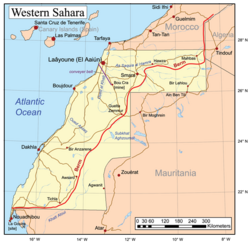Welcome to the Virtual Education Wiki ~ Open Education Wiki
Western Sahara
Original Re.ViCa entry by Paul Bacsich
For entities in Western Sahara see Category:Western Sahara
Partners situated in Western Sahara
None.
Western Sahara in a nutshell
(sourced from http://en.wikipedia.org/wiki/Western_Sahara)
Western Sahara (Arabic: الصحراء الغربية; transliterated: as-Ṣaḥrā' al-Gharbīyah; Spanish: Sahara Occidental) is a territory of Northern Africa, bordered by Morocco to the north, Algeria in the northeast, Mauritania to the east and south, and the Atlantic Ocean on the west.

Its population is around 500,000.
The largest city is El Aaiún (Laâyoune), which is home to over half of the population of the territory.
Its surface area amounts to 266,000 km2. It is one of the most sparsely populated territories in the world, mainly consisting of desert flatlands.
Western Sahara has been on the United Nations list of Non-Self-Governing Territories since the 1960s when it was a Spanish colony. The Kingdom of Morocco and the Polisario Front independence movement (and government of the Sahrawi Arab Democratic Republic or SADR) dispute control of the territory.
Since a United Nations-sponsored ceasefire agreement in 1991, most of the territory has been controlled by Morocco, and the remainder by the Polisario/SADR, said to be backed by Algeria. Internationally, major powers have taken a generally ambiguous and neutral position on each side's claims, and have pressed both parties to agree on a peaceful resolution. Both Morocco and Polisario have sought to boost their claims by accumulating formal recognition, essentially from African, Asian, and Latin American states in the developing world.
Polisario has won formal recognition for SADR from 46 states, and was extended membership in the African Union, while Morocco has won recognition for its position from the Arab League. In both instances, recognitions have over the past two decades been extended and withdrawn according to changing international trends.
Arabic is the only official language of both the Morocco-controlled zone and the Sahrawi Arab Democratic Republic zone.
Economy
Aside from its rich phosphate deposits and fishing waters, Western Sahara has few natural resources and lacks sufficient rainfall for most agricultural activities. There is speculation that there may be rich off-shore oil and natural gas fields, but the debate persists as to whether these resources can be profitably exploited, and if this would be legally permitted due to the non-decolonized status of Western Sahara.
Western Sahara's economy is centred around nomadic herding, fishing, and phosphate mining. Most food for the urban population is imported. All trade and other economic activities are controlled by the Moroccan government. The government has encouraged citizens to relocate to the territory by giving subsidies and price controls on basic goods. These heavy subsidies have created a state-dominated economy in the Moroccan-controlled parts of Western Sahara, with the Moroccan government as the single biggest employer.
As a sign of the impoverished and disorganised state the internet domain .eh is reserved for the territory but not used. The ITU Calling code +2123 is in fact a code for Morocco.
In view of the situation and the lack of suitability for e-learning it is not useful to add any more detail in this country report - but the section structure is maintained in case at some future date relevant information can be added.
Western Sahara education policy
As and when information is available it will be added.
Western Sahara education system
As and when information is available it will be added.
Higher education
None known.
Higher education reform
Not applicable.
Administration and finance
Not applicable.
Quality assurance
Not applicable.
Western Sahara's HEIs in the information society
It is indicative that the internet domain .eh is reserved for the territory but not used, and that the ITU Calling code +2123 is in fact a code for Morocco.
Virtual Campuses in HE
Not applicable.
Lessons learnt
Not applicable.
References
None.
For OER policies and projects in Western Sahara see Western Sahara/OER